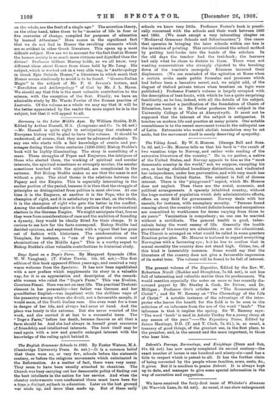Germany in the Later Middle Ages. By William Stubbs, D.D.
Edited by Arthur Ha.ssall, M.A. (Lougmans and Co. 7s. 6d. net.) —Mr. Hassell is quite right in anticipating that students of European history will be glad to have this volume. It should be understood, of course, that they must be advanced students. To any one who starts with a fair knowledge of events and per- sonages during these three centuries (1200-1500) Bishop Stubbs's book will be highly illuminating. The story is something of a maze. These struggles of Popes and Emperors, the intrigues of those who elected them, the working of spiritual and secular interests, the spiritual sometimes so strangely secular, the secular sometimes touched with the spiritual, are complicated in the extreme. But Bishop Stubbs makes us see that the maze is not without a plan. The chief theme is the relations between the Papacy and the Empire. This is especially interesting in the earlier portion of the period, because it is then that the struggle of principles as distinguished from politics is most obvious. At one time it is the Emperor, at another it is the Pope, who is the champion of right, and it is satisfactory to see that, on the whole, it is the champion of right who gets the better in the conflict. Among the subordinate topics is the position of the ecclesiastical electors in the German Empire. We might anticipate that, free as they were from considerations of race and the ambition of founding a dynasty, they would be ideally fitted for their charge. It is curious to see how far the facts correspond. Bishop Stubbs had decided opinions, and expressed them with a vigour that has gone out of fashion with historians. The condemnation of the Templars, for instance, is "one of the greatest crimes and abominations of the Middle Ages." This is a worthy sequel to Bishop Stubbs's other valuable contributions to historical study.






































 Previous page
Previous page